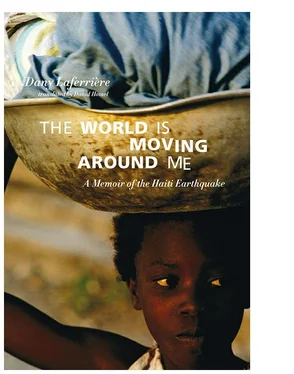Time on TV
Two kinds of time, if I can put it that way, face off in a fight to the death. One intends to eliminate the other: the time that belongs to nature and the time that belongs to television. In reality, the life of a people is counted in centuries, sometimes in millennia. When a society takes a new turn, sometimes we don’t feel that breath of fresh air for another thirty years. The maceration occurs very slowly. Collective time is like that cow chewing its cud by the side of the road. Each car that whizzes past brings a new generation of new human beings with their particular sensibility, their own emotions and battles to fight. Our cow has seen so many cars rushing by that it doesn’t even lift its head to look when a new one comes along. It will chew over the earthquake, and that will take the time it takes. The way it has only just finished chewing over the Duvalier era. That time is nearly immobile, and one man’s death is no more than a blip on its screen. On the other hand, time on television is always accelerated. On TV, you can watch a rose bloom in ten seconds. In times of great turmoil, like now, people are glued to the small screen. Long enough for this artificial time to end up infiltrating their systems. When we watch television for too long, we start to think we can act upon events unfolding before our eyes. Everything in our lives seems too slow. We demand instant changes. Every time we come back from the bathroom, we want to see something new. We want progress. Why doesn’t that truck go faster? We criticize people who are taking action, though we haven’t moved from our armchair for the last two days. After a while, we figure it’s time to move onto something else. If we can’t change reality, we hope it will at least turn into fiction. That’s what happens when we spend too much time watching television.
A Visit to the Doctor
A little cat at my mother’s feet with eyes so soft, almost frightened, you’d think it was a mouse. We found it in the yard after the earthquake. My mother adopted it immediately, and ever since they’ve been whispering secrets to each other. And understanding everything, according to my sister. My mother has left the gallery, and the little cat watches her go, completely at a loss, as if its world has just collapsed. We’re waiting for my mother in the car. My sister is taking her to the doctor’s, something she detests above all things. She looks exactly like the little cat. She comes out of the house, then returns to look for something, but won’t tell us what it was. She’s really just stalling. My sister wants to be the first in line at the clinic, since she has only the morning off. If the appointment doesn’t take too long, we’ll have time to get to the lab and do the tests before eleven o’clock. Then she’ll drop us back at the house and rush off to work. She’s already starting to sweat. She’s done everything at top speed this morning: making breakfast at the house and planning the day’s meal with the cook. She has so many things to sort out (the bills, for starters) as she looks after my mother, who has developed all sorts of capricious manners; her son, who never has what he needs for school; her husband, who catches a new disease every morning; her daughter overseas, who’s depressed — no wonder she doesn’t have time to think about post-earthquake stress disorder, which is the theme this week on the radio. Ever since some psychiatrists got on TV and declared that Haiti is an excellent laboratory for studying post-earthquake stress disorder, that spice is being added to every sauce. Everything is seen from that angle. You get to work late. That’s due to post-earthquake stress disorder, even if you’ve never been on time in your life. Finally, my mother gets into the car and we drive off. My nephew left with his father. My sister figures they have a fifty-fifty chance of getting a flat tire on the way, which makes my mother burst out laughing. My sister tells me the doctor is good, but a little expensive. We get there, wait a short time, then we’re ushered into his office. A large, restful room. The doctor is a thin man, concerned with his own appearance, but he seems competent; in any case he has a dry manner with the discreet warmth of efficient people. My mother is always intimidated when there’s a doctor around. My sister is attentive and care-worn. The doctor, half-serious and half-jovial, looks a little worried at the sight of my mother’s swollen foot, especially the wound on her right leg. He scribbles a few instructions on a pad and sends us off to get tests. The results will be expedited to a specialist. In the car, I say that the doctor is lucky that his clinic escaped undamaged. My sister tells me he’s been kidnapped at least twice. He’s a brave man. That’s the minimum you can expect when you live here, my sister says, staring straight ahead. We went to have the tests done at a private laboratory, so we won’t have to wait so long. I expected to see people with a certain income level there, but they come from everywhere. They weren’t talking about the earthquake — only the difficulty of keeping their heads above water. Finally, they called my mother’s name. Her anxiety was visible even in the nape of her neck. I’d forgotten how frail she is. She lists to one side, and her little black purse keeps slipping off her shoulder. Her face is radiant when she returns; she didn’t have to have a shot. We drove straight home, and my sister went off to work.
New Art Forms
What art form will be the first to come forward after the earthquake? Poetry, so impulsive, or painting, eager for new landscapes? Where will the first images of the earthquake be seen? On the city walls or the bodies of tap-taps ? Will the short story, not as fast as poetry but quicker than the novel, come back into fashion? The novel demands a minimum of comfort that Port-au-Prince can’t offer; it’s an art form that flourishes in industrialized nations. Are writers already at work? Will we see a race to write the great earthquake novel or the major essay about reconstruction? And the winner — will it be Frankétienne or a young, unknown woman novelist? Dalembert or a German writer who’d never even heard of Haiti before the event? Don’t forget that the great novel of the Haitian dictatorship ( The Comedians , 1966) was written by Graham Greene, an Englishman. The earthquake is a planetary event. It belongs to everyone. What would we think if this great tragic novel ended up being written by a talented, yet mannered, young upper-class writer? Would we take that book for what it is (a masterpiece) or see it as the ultimate slap from a jesting god? What style would it be written in? Ironic or tragic? Could it be comic, even if so many people died? Laughter to tears? Who will censor the works that don’t live up to the standard of what is tolerable? The church, the state, or society? Do artists who weren’t present at the time have the necessary legitimacy to turn the earthquake into a work of art? Is the new Haitian someone who went through the event? The race has begun. But we’ve lost something: our intimacy. Everyone is carefully scrutinized now. Just to speak your mind, you have to show you’re clean. Say how many deaths you had in your family. As if it were a war, not an earthquake. When it comes to the Lisbon earthquake, Voltaire’s poem is what remains.
Social Bonds
There are hundreds, perhaps thousands of teenagers orphaned by the earthquake. Some have lost all their family members. If we allow them to drift, it won’t take long before we have a serious crime problem in this country. People think twice about killing when they have relationships with others. When the opposite is true, they develop a terrifying insensitivity. They’d hesitate to rob a woman who happens to be the mother of a schoolmate. Or kill a former teammate for his money. These bonds develop during childhood. They make us an integral part of society, and we owe it something. If we don’t start working on the social network, the city will soon become fragmented and gangs will multiply.
Читать дальше












